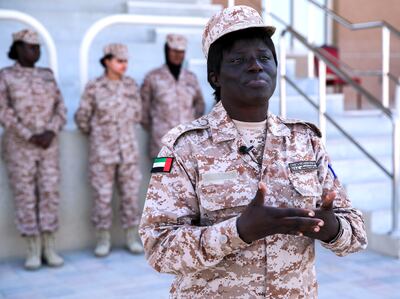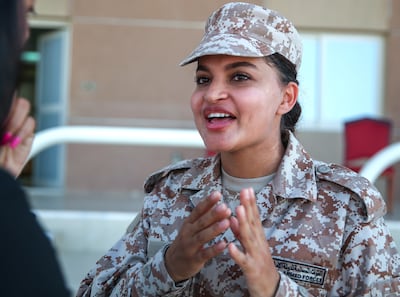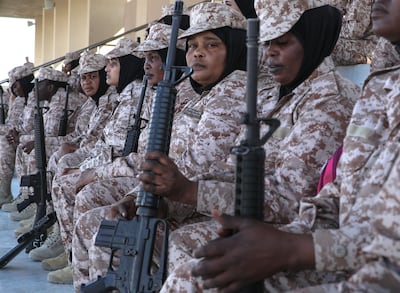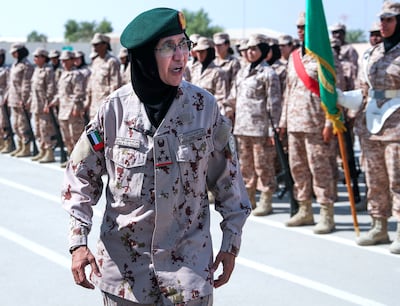An army of women have joined forces in Abu Dhabi on a mission to bring an end to tyranny and violence by being champions of peace.
The National was given exclusive access to see 157 cadets go through their paces in an intensive 10-week training course at the Khawla bint Al Azwar Military School, inside the UAE’s Armed Forces base in Mahawi.
All had their reasons for being in the capital as they embarked on a key stage of their journey to enlist in the UN's peacekeeping corps.
Some were spurred on by a desire to see an end to conflict in their homelands, while others relished the opportunity to be part of a military collective.

Fatima Anne T Mendy, an immigration officer from The Gambia, who is in her 40s, said she had never held a gun until she arrived in Abu Dhabi.
The results of Ms Mendy's time in the capital were evident as she picked up an M-16 rifle and took aim at a target in front of her.
Her training was vital as peacekeepers could be sent to some of the most hostile parts of the world, seeking to protect civilians and maintain order in countries still ravaged by the effects of war, where ceasefires can be fragile.
“I had never held a gun before but now I am confident I can defend myself and even others in any situation,” Ms Mendy told The National, which was granted access to the training ground.
“This training will help women have a voice in the security sector and make a difference in any missions they are sent on.
“For me, it was a big advantage to get trained under the UAE’s defence forces. It was a big experience that will help me contribute to the safety and security of victims of conflicts and unrest.”
The programme was organised by the General Women's Union in partnership with UN Women and the Ministry of Defence.
The Emirates is the first country to train UN Women peacekeepers under an agreement signed in September 2018.
'I can make a difference'
Second Lieutenant Doha Harbi Sharhan, from Iraq, was eager to make the most of the chance to hone her skills.
“I joined this training course because this was the first time Iraqi female officers got to train abroad,” she said.
“This experience was quite different given that there are no military camps for women in Iraq.”
Growing up in Baghdad and seeing the unrest and violence in her home country, Lt Sharhan said she understood the importance of peace and stability.

“I love being in the military,” she said. “Many of my family members were also in the army. I believe I can make a difference.”
Lt Remadji Stephanie, from Chad, also wants to help to build a brighter future.
“I am determined to go back home to help end the terrorism and violence we face at the hands of Boko Haram, not through violence but through peace,” she said.
Another participant, Major Luljeta Mehmeti Quigley from Kosovo, said she wanted to see more women in peacekeeping.
“The importance of women participating in UN peacekeeping missions is more crucial than ever before,” she said. “Women peacekeepers can bring a different touch and they are capable of serving the same as men anywhere in any peacekeeping mission.”
Champions of peace
The Khawla bint Al Azwar Military School, the region’s first women’s military college, established in 1990, hosted the first programmes under the partnership in 2019 and 2020.
The UAE has so far trained 357 women cadets, with many drawn from Arab, African and Asian countries.
The third class included women from 15 countries, including Yemen, Jordan, Bahrain, Gambia, Senegal and Pakistan.
Wearing the UAE military uniform, the women assembled at the training ground every morning.

“How is our morale?” Brigadier Afra Saeed Al Falasi, Commander of the Military School, asked the cadets, with the rousing response coming instantly: “High. High. High.”
During the course, the women went through eight weeks of military training and two weeks of peacekeeping, covering combat, weapons, shooting, drills and first aid.
“Cadets undergo a change in their lives during military training,” Brig Al Falasi said.
“It prepares them for a transition from civil life to military life, teaches them patience and increases their awareness.
“The course strengthens their personality, prepares them for emergency situations, teaches them self defence, how to protect their surroundings and provides them with the skills to complete any task,” said Brig Al Falasi, who belongs to the first class of women officers to pass out from the military school in 1990.

Increasing women’s representation is key
Although women are increasingly playing an important role in UN peacekeeping missions, there is progress to be made.
In 1993, only 1 per cent of all deployed uniformed personnel were women.
By 2012, women made up 3 per cent of military and 10 per cent of police personnel in UN peacekeeping operations, according to the UN.
Currently, women account for almost 30 per cent of the international civilians working in peacekeeping and special protection missions.
Dr Mouza Al Shehhi, director of UN Women liaison office for the GCC, said bolstering female participation was less about gender equality and more about having the right people for the job.
“It is about generating and championing solutions that reflect the needs of all people in conflict-affected settings and addressing the underlying conditions that create conflict in the first place,” she said.
“Women’s leadership in peace and security helps in dismantling systems that allow violence to happen in the first place.
“Data shows that women’s participation in peace processes increased by 20 per cent the likelihood of a peace agreement lasting at least two years, and by 35 per cent the probability of it lasting 15 years.
“Yet this year, women represented 19 per cent of delegations in UN-led peace processes — down from 23 per cent in 2020.
“This data puts a lot of emphasis on the importance of capacity building for women in peace and shines a light on the uniqueness of this training programme that impacts capacity-building directly and gives women the opportunity to start or enhance careers in peace and security.”












